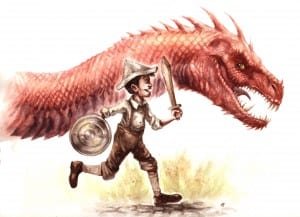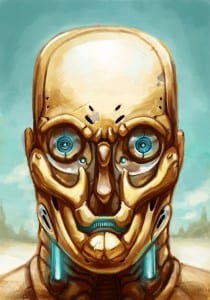Midnight, and the bones are almost finished. She sinks a wooden spatula into amber broth, hands and arms wet from silver steam that excites like fetal ambrosia, wading the spoon through the mass of soup in yin-yang swirl, a softly unyielding coaxing lifting imperfections and feeding discoloration into a cheesecloth bag she has replaced the spoon with, almost of the scum’s own volition. Gingerly, almost sad to leave the liquid dance, dampened to see whorls cease, broken by the heatedly rising bubbles, she pulls the bag & imperfections free of the clean soup, which has turned an earthy-gold color. The bones are blanching out into the water, surrounded, shaken and filled with the very liquid color that once verified they were the knuckle, the femur, the shank of something once very alive, that had loved these bones very much and that would be surprised to see what use they had now.
A buzzer brings her to the oven. Inside, the silvered onion and garlic, cut in half and then left to roast at two hundred degrees for three hours, bleeding caramel allium-blood for the last half hour. Spider webs of bronze ooze from along the onion’s separating rings, spilling beyond and into the pan, now fused to thinly cut ginger. The hot cloud of all the sublimated flavors rushes out of the open door smelling like god itself. She imagines the way a sailor, lost at sea for far too long, must revel the first time again breathing air fresh from the coast, heavy with grass and compost. It is a smell of blessedly undeserved life, something granted by some strong and certain force, she reassures herself. A metal spatula slides under one corner, applying a worrying pressure until it slips to a certain point and removes the alliums like a pancake. Once free, she lifts it by a corner, stirring it into the boiling broth when someone knocks on the door.
She lives alone and takes no visitors, family long dead or living just as far away, but with a certain middle-aged grace she lowers the sheet into the broth and dampens the heat, making sure nothing is close enough to the stove-fire to burn while she isn’t looking, as has happened so often, then walks to and opens the door.
“I want soup,” says a rabbit-eyed and eared girl, dressed in frilly white children’s clothes hemmed with pink elephants and a pink trim that seems made for someone half her size, clothes which soften the tantrum-rage inherent in the spirit’s face, but that can’t quite dispel it or her wildness, tangled boughs of auburn hair that surrounded her head like a treeline horizon, or the unnerving fact that she is chewing on her left ear, because the right one has been bitten so far back she can no longer reach it. Her eyes, the color of stale pistachios, which are rounder than the human eye and slanted downwards, seem perpetually weepy.
“My name is Dahlia. I want soup,” the rabbit girl says. Her eyes and ears and teeth and fingers are all twitching to their own beat, her soft white down lined in a sheen that rippled as she moved. “More are coming.”
She knows better than to fight with ghosts, so she steps aside while Dahlia scampers through the door. She asks Dahlia who she is, which Dahlia refuses to answer, but rather just stares back at her with weepy green eyes. She asks Dahlia other things about who else is coming, to which Dahlia assures her:
“Others with the same reasons as me.”
Which of course means nothing. She concedes to the spirit’s stubbornness, prepares to clean up the mess Dahlia is making, for once in the house the creature has not ceased moving, but there will be no cleaning until the soup is done, the ghosts are sated, and she is finally alone, because she is busy with the attention-hungry peppercorns and cinnamon bark and cardamom pods frying in cast iron, which she has somehow forgotten to prepare until this late hour, but also because so habitual is her solitude that intruders afford her no patience or wherewithal to multitask, so the spices are at this moment the only thing in her world.
She pestles dried turmeric root, careful not to let the pieces fly up past the lip of the stone mortar. Eventually the chunks are crushed into pebbles, then grains, then the occasional lumpy piece of sand. When the fiery orange powder hits the marrow broth, the soup lights up gold like a baby’s face.
With a homey hissing from the hot oiled peppercorns, she flips the pan’s contents into the pot then stirs the broth. As the spoon suffers its third tap on the pot’s steel rim, there is another knock at the door.
So it goes until the house is full. In order of arrival: an incredibly thin, incredibly tall man with cacti for fingers and genitals and tongue, who tries to tell her to keep secrets, to lie for him, stroking her shoulders until she threatens to make cactus juice. A three hundred pound bearded baby named Jericho, who demands refreshments and appetizers while waiting for broth, yelling at her, telling her how much she owes him, how much he could do to her without even trying, and how dare she take so long getting his guacamole, claims to be the father of all women. A boy-faced lizard with dove’s wings but no legs, who never ceases flying though he looks exhausted, and who is surely the kindest spirit there, tells her the truth.
“You do not have enough for both,” he tells her. “They will take everything from you, if you let them.”
For small periods of time she is able to hold him, to allow him to rest his wings, but in the end her duty is to the soup, and the ghosts pull him away from her hands so that she will continue. Countless, because she will not count them, spirits crowd the house, and all claim to know her.
A kind of quiet panic tries to take hold but finds her heart to slippery. Instead she pours herself into the heavy knife, slicing chives into papery green rings, limes into segments, Thai chilies in red and green and yellow stripes, finally cleaving off thin pieces of beef, frozen so she could cut it so thinly, trying to ignore the fact that some weird nostalgia is rising off the medley of colors and smells and coagulating into long dead, incandescent caricatures. What would her mother say of her, unwed and feeding ghosts, but she can imagine saying cruelly to her mother, of course I am unwed, of course I am feeding ghosts.
The ghosts smell their own ghosts in that broth, and so on and out. The closer the soup comes to being done, the more they rustle inside the instability of their gregarious proportions, ever more ready to collapse like a chain-gang into the sea, each trashing in an attempt to surface, dragging each other under the black salt tableau. They have never coexisted with any grace, and what community they are forming and what idle conversation they are managing focuses entirely around their sole commonality.
“She does not grieve enough,” says the bearded baby between fistfuls of guacamole.
In response, a girl with no hands but rather ever flowing waterfalls that course out of bone river beds, says, “Wrong! Wrong! She succumbs too easily to the vulgar ego trap that is depression.”
“Her humiliated soul deserves peace from your judgment,” whispers the boy-faced dove-winged legless lizard, hovering in the air next to her shoulder.
She refuses to look at them again until the soup is done, consumed as she is by the final preparations. Noodles, thin but far from angel hair, a specific texture completely altered by a hundredth of a centimeter, which could make a noodle suddenly unpairable with the flavor profile of a particular broth, this particular broth, which itself had a kind of fragrant texture that demanded a good partner, and could not be expected to come into its fullness otherwise. But if the partnering was wrong? If she ruined the soup with some foul pairing? She lets go of her controlling grip, and the noodles slip into the boiling water, which, giving off a pillar of steam, retreats into a temporary simmer.
A terrible thing is happening and no one sees it, but it happens anyway.
As the pillar rises, the boy-lizard, who has accidentally floated above the pot during an argument with a woman with broken telescope eyes over whether or not the fatal flaw of their host is the way she avoids looking at people, when he is swept upwards by the rising heat. She does not see this, she is consumed by the broth, the attention and love it needs and the peace it provides, while he is overjoyed, for the exhausting burden of gravity seems to be stripped away at last, and for the first time since his death he can stop struggling his wings just to stay afloat, but the pillar soon dissipates, spent as it is, and as he begins to sink towards the molten gold broth, and his wings are soaked with steam and stiff from the heat, and he cannot save himself. She tries to fish him out, but he’s disappeared.
She cries out. Tears fall into the soup, quickly indistinguishable from anything else.
The spirits have begun to fester, rotting and dying. The bearded baby is clutching his heart and wrists in turns, his breath getting short. The woman of waterfalls is reduced to a trickle, her skin drawn like a dry lemon. Dahlia, rabbit-eyed and eared girl, the first guest, is bloody and purple from running into obstacles with a feverish, unceasing energy. She can no longer reach her left ear, it has been bitten too far back. The rest, in the dozens, the droves, legions of ghosts, by their own power, are finding inventive ways to destroy themselves, some slow, some sudden, and they won’t stop talking about her.
Dahlia breaks away from the rest, comes and turns to her with regret in her hair.
“What would you ask us to become?”
The bearded baby only ceases speaking when his heart collapses, just like her father’s. She does not know what to do. She is horribly aware of the possibility that if she cannot feed them in time and with the greedy measure they demand, the remaining ghosts may perish. There is not enough for her to also drink. She is so frightened now, realizing that she herself feels fermented, like some bacterial alien other taking her shape, turning her into soup and soil which it will use to live, to sustain. She knows that there is not enough time to make more soup, that there are not enough bones. She is frozen, and she has begun to consider doing nothing, feeding no one, sitting here and giving herself to the infection.
At once she both wishes for them to disappear and yet instead to remain, and she could not be responsible for killing ghosts, but the soup is done, all but for a few things, and if she does in fact choose to never remove the remainder of what could not be digested, the roots and the bones, and merge that perfect golden broth with the perfectly proportioned noodles, to make something of the effort and the energy and the life that came before, then what, if anything, could she do? She asked the advice of the spirits, but all they could say to her was, “Soup.” She grabs a strainer, but instead of lifting the pot she stood there, one hand not entirely holding the pot’s handle, right on a certain line between two uncertain things, and she felt almost content to stay there forever, immediately in the moment before.



